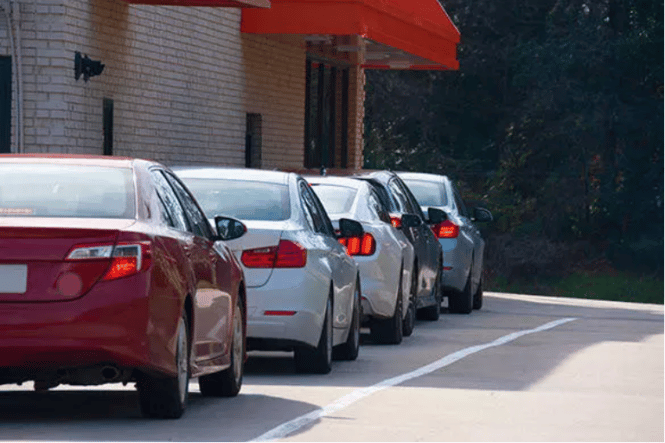
Last Updated on August 10, 2025 by Staff Writer
Drive-Thru Evolution Whitepaper
Learn the latest drive-thru trends taking place across the restaurant industry that are meeting customers’ needs while increasing operators’ revenues. For more information, you can email [email protected]
Executive Summary
Once considered an adjunct to an established restaurant, the drive-thru has evolved into an essential business component helping eateries achieve profitability and exceed customer expectations. Drive-thrus are illustrative of a case where technology has helped redefine the dining experience. QSR Magazine cites examples of national chain restaurants that have more than doubled revenues by implementing an effective drive-thru strategy. The drive-thru has become the industry’s most popular off-premises channel having accounted for fifty-two percent of to-go orders in 2021. This growth activity represents an increase of four percent over the prior year.
Most industry practitioners believe restaurant success depends as much on service quality as it does on food quality. The speed and coordination in preparation, as well as the wholesomeness of menu items, are critical factors. Consumers have always sought speed and accuracy with a drive-thru order, but pandemic circumstances amplified guest expectations to include personalization and concise communications. From a drive-thru perspective, clear communications, accurate order entry, and secure payment processing are core technical elements for an effective operation. It is estimated that the average American will spend more than $1,200 on drive-thru food this year. This sum represents a substantial annual increase attributable to the restrictions of the pandemic.
Simply stated, drive-thru’s have become the restaurant industry’s most popular off-premises channel, accounting for more than half of all to-go orders in 2021, according to industry researcher NPD. This business volume represents an increase of four percent over the prior year. During the pandemic, restaurant takeout orders experienced exponential growth. As a result, operators need to continue supporting a multiple-channel approach to off-premises dining that also includes delivery services and order-ahead options, including mobile apps.
According to QSR Magazine, no area has seen more digital improvements than the restaurant drive-thru. Many industry practitioners claim the pandemic made the drive-thru an essential part of keeping restaurants open during lockdowns. It was the sole way to serve customers at eateries across the country continuously. To thrive amid elevated off-premises demand, restaurants have begun investing in innovations designed to maximize delivery, curbside pickup, and drive-thru offerings. These plans for futuristic store models include digitally integrated double and triple drive-thru’s to accommodate mobile orders better, and take out, with reduced on-premises dining room space. For example, consider the two-story Taco Bell in Brooklyn Park, Minnesota that according to tacobell.com was developed featuring four drive-thru lanes, including three lanes designated for mobile or delivery order pickups. The fourth lane will offer a traditional drive-thru experience with face-to-face interaction between customers and staff.
Download the full whitepaper here (9 pages) — DRIVE THRU IFBTA Panasonic May2022
Authors
Michael L. Kasavana, Ph.D., CHTP, CFTP
MSU/NAMA Professor, Emeritus
IFBTA Education
and
Amy Fanale
Sr. Product Manager
Panasonic Connect North America
More Posts
- Transformation of the Drive-Thru – Whitepaper(Opens in a new browser tab)
- 5 Key Learnings from Panera’s Digital Transformation Blaine Hurst(Opens in a new browser tab)
- Load Balancing (ie Drive-Thrus Drive People Away)
- Wrap – Four Lane Drive-Thru Taco Bell Defy (with kiosk)
- Legal News — McDonalds Sued for Improper Use of AI Biometric Data in Drive-Thru




